Allocating Security Expenditures under Knightian Uncertainty: an Info-Gap Approach
In this paper we demonstrate a methodology aimed at coping with resource allocation under Knightian (non-probabilistic) uncertainty by focusing on the example of competing security measures. The results of this application to security resource allocation also allow us to postulate a possible positivist explanation for the way governments are allocating these expenditures today. We explore […]
Environmental technologies – the green future
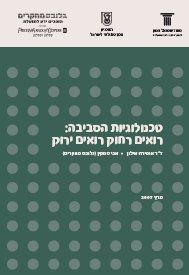
The field of environmental technology development includes a very wide range of activities. In the study, which is conducted jointly by the Samuel Neaman Institute, Globes Research and Kesselman & Kesselman, we show that there are very large opportunities in the new market and that the government must take a series of actions realize these […]
Liquidity Constraints on the Attainment of Tertiary Education in Israel
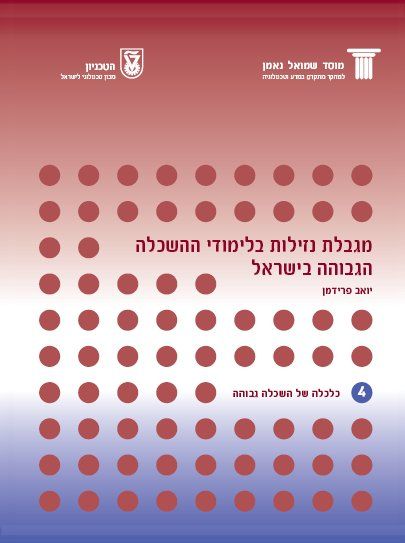
This study examines the effect of a family’s economic background on the chances of a twelfth grade high school student to obtain a first (bachelor) degree. The study analyses the marks obtained in the matriculation certificate by twelfth grade students in 1992-97, together with their parents’ demographic and social data taken from the 1995 census, […]
Energy Forum 4: Solar energy for the production of heat
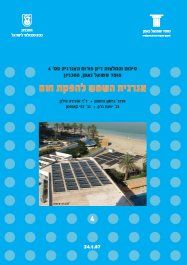
Introduction The Samuel Neaman Institute for Advanced Research in Science and Technology, within the framework of its activity in the energy field, conducts meetings of the Energy Forum, devoted to discussions and debate over energy related issues of national importace. The Energy Forum holds focused discussions regarding specified themes, and teams of subject-matter experts are […]
Reclaiming the Dead Sea, Alternatives for Action
The Dead Sea, the lowest and saltiest sea in the world, is currently in a state of severe environmental degradation. Water extraction from the Jordan River, the Sea of Galilee, and the Yarmouk River for Israel, Jordan, and Syria, as well as the extraction of Dead Sea water for industrial plants in Israel and Jordan, […]
Two Seas Canal – Is it a real aim or some kind of a preconceived solution to an unspecified target?
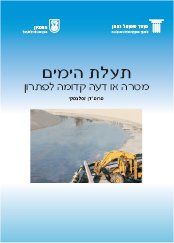
This paper deals with the necessity of finding alternative water resources to Israel’s emptying water reservoir. The author, Prof. Dan Zaslavsky, is rejecting in this paper the idea of The “Two Seas Canal” (an idea that was rejected formerly five times for economic inefficiency and for other various reasons) and is suggesting two different alternatives. […]
A Strategy for Developing Employment Opportunities for the Arabs in Israel: The Vision for Expanding the Arab Middle Class
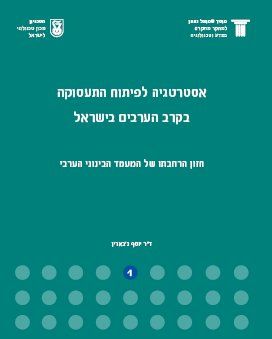
This study analyzes the problems that face the Arab community in Israel in the field of work and employment. It presents a strategy for developing employment opportunities for the Arab minority in Israel. Moreover, the study suggests a new vision for expanding the Arab middle class in Israel by developing equal employment opportunities.
Investment Policies in Defense R&D Programs
Investment in advanced defense technologies is a prominent characteristic of modern armed forces. The paper examines the optimal investment policy in developing such technologies, accounting for their S-shaped progress profile and the stochastic nature of the R&D process. We show that the optimal investment is a discontinuous function of the available budget, and that its […]
Energy efficiency in Ein Harod Ihud
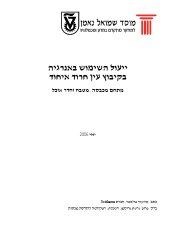
The work was prepared as part of the Ein Harod Echud project – Kibbutz Yerok. The purpose of the work was to examine ways to save/reduce energy costs in the group and to propose cost-saving measures that include the use of alternative energies, while meeting the criteria of economic viability. The initial report focused on […]
A National Plan for the Chemical Industry in Israel
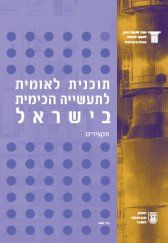
The National Plan for the Chemical Industry in Israel is a large project that the Samuel Neaman Institute has been leading since 2004. The project analyzes past and present chemistry and pharmaceutical branches produced in Israel, present alternatives and demonstrates new industry branches in this field. This project compares this industry with other global markets […]
